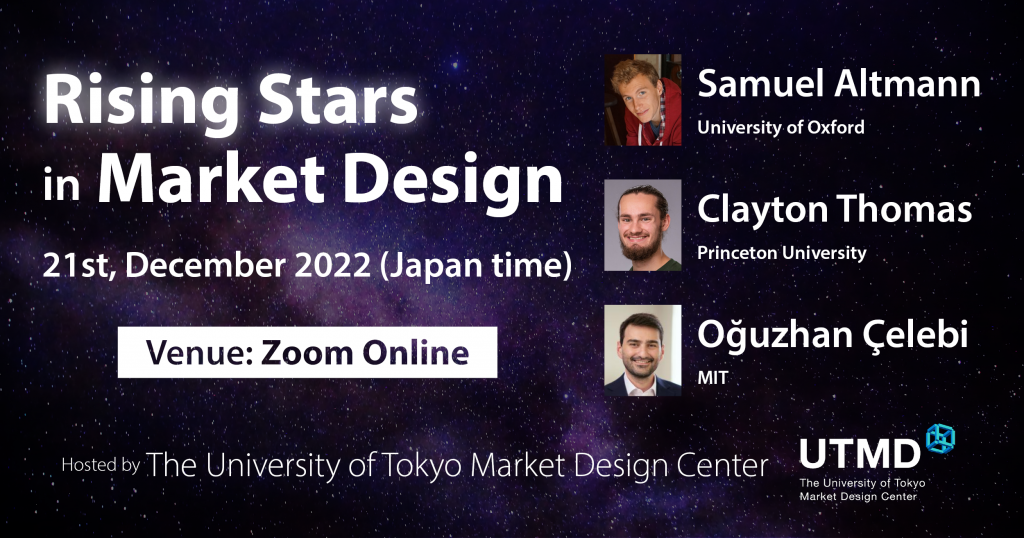(研究者向け)第2回 Rising Stars in Market Design

We host an international workshop on market design presented by young researchers.
*All times are Japan Standard Time (JST).
*The workshop will be held online using Zoom (pre-registration system).
*Presentations are in ENGLISH.
*Please refrain from taking pictures, recording audio and video.
*Please do not reproduce the contents or share the Zoom joining URL with a third party.
Registration
Please use the following link for registration.
Registration link
*The same meeting URL can be used for UTMD seminar series.
Schedule
Samuel Altmann (University of Oxford)

Date & Time: 2022/12/21(Wed) 9:00-10:00am (JST)
Title: Choice, Welfare, and Market Design: An Empirical Investigation of Feeding America’s Choice System
Abstract: Feeding America, an organisation responsible for feeding 130,000 Americans every day, distributes donated food among a network of participating food banks. Feeding America’s allocation mechanism, the ‘Choice System’, uses first-price auctions to allow food banks to signal which types of food they need from Feeding America. This provides food banks a large degree of choice over the types of food they receive. This paper examines the welfare and distributional consequences of enabling this choice. I apply a dynamic auction model to Choice System bidding data, estimating the distribution of food banks’ heterogeneous and time-varying needs. I then use these estimates to compare the Choice System to the previous allocation mechanism employed by Feeding America which gave food banks very limited choice. I estimate that the Choice System increased welfare by the equivalent of a 17.1% increase in the quantity of food being allocated.
Clayton Thomas (Princeton University)

Date & Time: 2022/12/21(Wed) 10:10-11:10am (JST)
Title: Strategyproofness-Exposing Mechanism Descriptions
Abstract: A menu description defines a mechanism to player i in two steps. Step (1) uses the reports of other players to describe i‘s menu: the set of i‘s potential outcomes. Step (2) uses i‘s report to select i‘s favorite outcome from her menu. Can menu descriptions better expose strategyproofness, without sacrificing simplicity? We propose a new, simple menu description of Deferred Acceptance. We prove that — in contrast with other common matching mechanisms — this menu description must differ substantially from the corresponding traditional description. We demonstrate, with a lab experiment on two simple mechanisms, the promise and challenges of menu descriptions.
Oğuzhan Çelebi (Massachusetts Institute of Technology)

Date & Time: 2022/12/21(Wed) 11:20am-12:20pm (JST)
Title: Adaptive Priority Mechanisms
Abstract: How should authorities that care about match quality and diversity allocate resources when they are uncertain of the market they face? Such a question appears in many contexts, including the allocation of school seats to students from various socioeconomic groups with differing exam scores. We propose a new class of adaptive priority mechanisms (APM) that prioritize agents as a function of both scores that reflect match quality and the number of assigned agents with the same socioeconomic characteristics. When there is a single authority and preferences over scores and diversity are separable, we derive an APM that is optimal, generates a unique outcome, and can be specified solely in terms of the preferences of the authority. By contrast, the ubiquitous priority and quota mechanisms are optimal if and only if the authority is risk-neutral or extremely risk-averse over diversity, respectively. When there are many authorities, it is dominant for each of them to use the optimal APM, and each so doing implements the unique stable matching. However, this is generally inefficient for the authorities. A centralized allocation mechanism that first uses an aggregate APM and then implements authority-specific quotas restores efficiency. Using data from Chicago Public Schools, we estimate that the gains from adopting APM are considerable.


 English
English